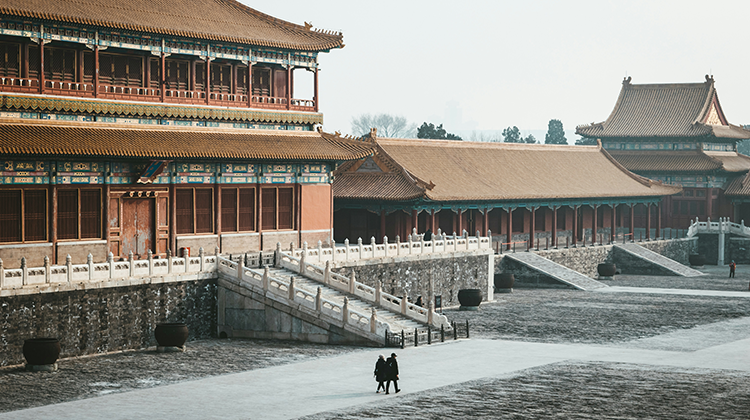As a Chinese teacher, I’m always looking for ways to help my students connect with the language on a deeper level. I believe language learning is also about understanding the culture, history, and philosophies that make the language come alive. Today, I’d like to share two of my personal favorites: Moment in Peking, a sweeping historical novel, and Thirty Thousand Miles from Chang’an, a beautifully crafted animated film. Both of these works capture the spirit of China in different periods, and I believe they can enrich your understanding of the language and culture in profound ways.
1. Moment in Peking (京华烟云) by Lin Yutang
- Author: Lin Yutang
- Published: 1939
- Genre: Historical Fiction, Family Saga
Moment in Peking is a novel I often recommend to students who want to grasp the depth of Chinese culture and values. It’s not just a story; it’s a journey into the heart of early 20th-century China, following the lives of three families as they navigate monumental social and political changes. The novel opens during the turbulent Boxer Rebellion and moves through the fall of the Qing Dynasty, showing us how ordinary people were affected by these seismic shifts.
- Why I Recommend It: This novel offers such a rich portrayal of family life, tradition, and the balance between modernity and Confucian values. For anyone interested in understanding the Confucian ideals of filial piety, loyalty, and duty that still influence Chinese society today, Moment in Peking provides a beautifully nuanced window into these ideas. Lin Yutang’s characters—especially the protagonist, Yao Mulan—are strong, multifaceted, and deeply connected to their culture, making their lives feel relatable even today.
- Tip: The novel was originally written in English and introduces Chinese idioms and philosophy in a gentle way, giving readers a sense of the rhythm and essence of the Chinese language. I often encourage my students to note down any philosophical phrases or values they encounter, as these can add so much depth to their understanding of Chinese thought.
- TV Adaptation: For those who might find a 600-page novel a bit daunting, there’s a TV adaptation of the same title that aired in 2005. This series does a great job capturing the main events and emotional essence of the novel, making it a wonderful option for those who prefer to watch the story unfold. The series is in Mandarin and is available on YouTube.
2. Thirty Thousand Miles from Chang’an (长安三万里)
- Directors: Xie Junwei, Zou Jing
- Released: 2023
- Genre: Animated Historical Film
This animated film is set during the Tang Dynasty, a period often considered the golden age of Chinese culture, and follows the lives of two of China’s greatest poets, Li Bai and Du Fu. Watching it is like stepping into a Tang Dynasty painting, with vibrant visuals and poetic language that evoke the spirit of an era when art and intellect flourished.
- Why I Recommend It: The Tang Dynasty is a defining period in Chinese history, especially when it comes to literature and art. Li Bai and Du Fu’s poetry has an almost universal appeal, but understanding it in the original Chinese adds so much richness. The movie brings these poets to life as complex, relatable individuals, showing us their friendship, their ambitions, and the conflicts they faced as artists in a turbulent world. For students interested in classical Chinese poetry, this film is a stunning introduction.
- Tip: The movie includes some of Li Bai and Du Fu’s most famous poems, spoken in Mandarin. This is a fantastic way to practice listening comprehension, and the beauty of the language itself can help you appreciate Chinese tones and rhythm on a deeper level. I suggest listening to these poems a few times, focusing on how the sounds and structure create a unique cadence. You can also try memorizing a few lines—a wonderful way to connect with the language’s musicality.
Tips for Learning Chinese Through Movies and Series
One of the most effective ways to immerse yourself in the language and culture is through watching movies and series, especially those that reflect historical and cultural themes. Here are some tips I often share with my students to help them get the most out of these experiences:
1.Start with Subtitles: I usually recommend watching with Chinese subtitles, even if you’re not yet fluent in Mandarin. Reading the characters as you hear the words reinforces your understanding of vocabulary, sentence structure, and tones. If that feels overwhelming, you can start with English subtitles, then switch to Chinese when you’re more comfortable.
2.Take Notes on Key Vocabulary and Expressions: Keep a notebook or digital notes handy while you watch. Write down new words, idioms, or expressions that you find interesting. Not only will this build your vocabulary, but you’ll also start to see how language reflects cultural ideas.
3.Rewatch Important Scenes: Some scenes may feature more advanced language or key cultural elements. I suggest going back and rewatching these scenes, as they can offer valuable insights into how native speakers use tone and intonation. For example, in Moment in Peking, certain dialogues explore Confucian values in a way that shows how language carries meaning beyond just words.
4.Research Historical and Cultural Context: One of the joys of studying Chinese is discovering how deeply history is woven into the language. Taking time to read about historical events or cultural references mentioned in the works above can deepen your appreciation and make the learning experience richer.
5.Practice Speaking: For advanced students, I recommend pausing to repeat key phrases or lines, mimicking the pronunciation and intonation. This practice can improve both your fluency and confidence.
6.Share and Discuss: Discussing historical events, cultural values, and character motivations can deepen your understanding and bring new perspectives to the material. Plus, it’s a great way to practice using new vocabulary and expressions. Leave a comment below on what you think about the material or discuss with your teacher!
I hope these stories inspire you to explore China’s past and bring even more meaning to your language journey. Happy learning!







